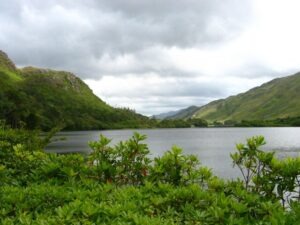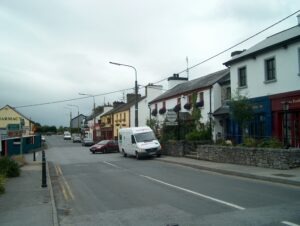If when you have your DNA tested for ethnicity and you find where your ancestors were from (or if you already know), does this make you want to travel there?
It does me.
There’s an intriguing phenomenon of feeling at home when visiting an ancestor’s homeland that I’ve experienced and would like to share.
My initial ancestry.com autosomal DNA test stated that I was 7% Irish, which didn’t sit well with me. I “felt” more Irish. Well, as ancestry.com has accumulated a bigger database, their results have changed. I am now recorded as 29% Irish. The results narrow it down further to pinpoint where in Ireland my ancestors were from, which is the Southern Connemara and the Aran Islands of County Galway (the district with the most Irish speakers in all of Ireland). A small area, maybe just 1/32nd of the country.
I wonder how much more our DNA will teach us in the coming years?

Many years ago, before my DNA test, I went to Ireland for an art landscape workshop. With seven other artists and our teacher, we spent ten days in the beautiful Connemara region on the west central coast of Ireland. Chosen for its incredible scenery, the landscape was a mixture of vibrant green meadows, peat bogs, heather covered mountains, picturesque lakes, woodlands, rugged hills, and glorious coastlines of crystal blue bays and sandy beaches. We saw Kylemore Abby and crumbing castles, and stayed in quintessential Irish towns such as Clifden, Roundstone and Letterfrack. Drawing and painting as we went, but also visiting quirky shops and traditional Irish pubs.

We spent a lot of time drawing Clifden Castle and landscape in Connemara.
Near the end of our ten-day journey, we were traveling down a road in County Galway when I started to experience an unusual awareness, somewhat similar to a feeling of familiarity. My heart rate quickened. I had never been to Ireland before, and consequently never to this area. The scenery was nondescript to what I had been seeing all week.
We stopped for gasoline (petrole as they called it). As I disembarked the small bus, I asked our Irish driver, “Where are we?”
“Moycullen,” he said.
A feeling washed over me that seemed to make every fiber tingle. This was my ancestral home. My Flaherty great-great grandparents had left this place in the 1860s. Not only were they originally from Moycullen, but so were many generations before them.
Once the vehicle was filled with gas and the artists ready to go, I couldn’t make myself get on the bus. My soul was crying out to walk the streets and continue feeling this strange, spiritual connection to a small village, which in actuality didn’t look ancient or have landmarks of antiquity that would bring to mind my ancestor’s lifestyles.
I told them to go on without me, that I needed to discover what I could about the place. They headed to Galway City, 12 km south, with plans that I would find a bus or taxi to meet up with them late in the day.

As a genealogist, I was familiar with how to do research. I headed to the closest church I could find. I won’t go into the details about my search. What I really want to discuss is where did those feelings of familiarity come from?
Are there memories in our genes?
Are we like migratory animals who know where to go instinctively? I know there are other humans who have experienced the phenomenon of feeling “at home” when visiting their ancestor’s homeland. It is often explained as a deep spiritual connection or an affinity for a place that acts as an anchor for identity. Is it just a yearning, or are the memories for “place” in our DNA?
How does all this play into genetic roots?
When I think of myself, I think Irish. I look Irish. Irish food is one of my favorites. Irish songs make me want to dance. Irish folktales titillate my imagination. The genetic ethnicity DNA tests are not showing all we inherit from our ancestors. It gives us clues as to where to look for records, but not the effects ancestors have on our memories. We should not mistake DNA markers used to determine ethnicity (physical traits and geographic ancestry) and DNA tags we inherit through our ancestors’ experiences and memories (epigenetic inheritance) as the same thing.
DNA is not just a blueprint of what we will become physically, but perhaps also emotionally and psychologically. Certain diseases and disorders also have links to our DNA. It might just be that in some ways our ancestors are with us always.
